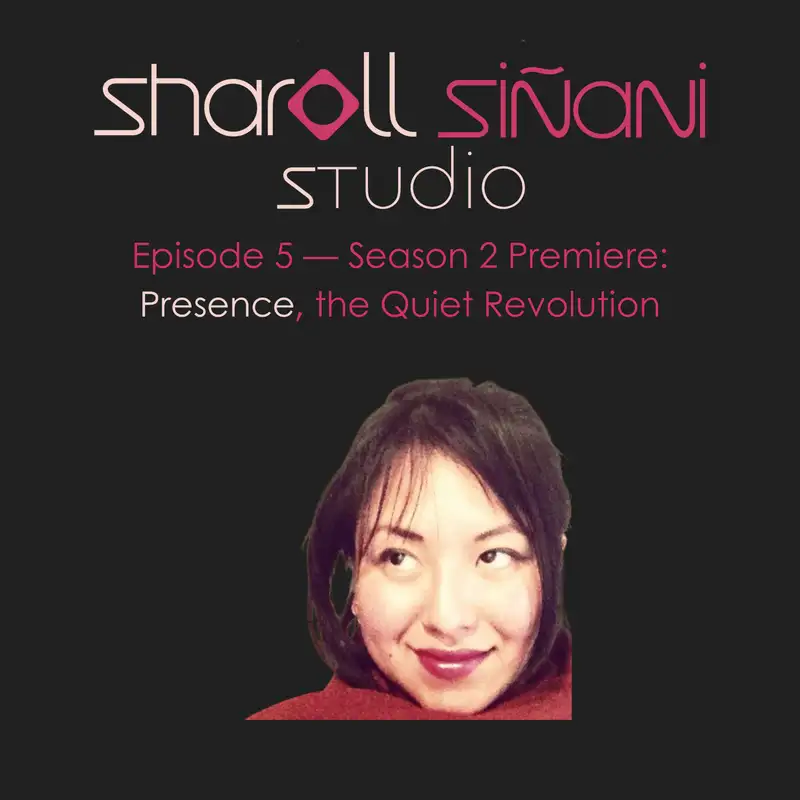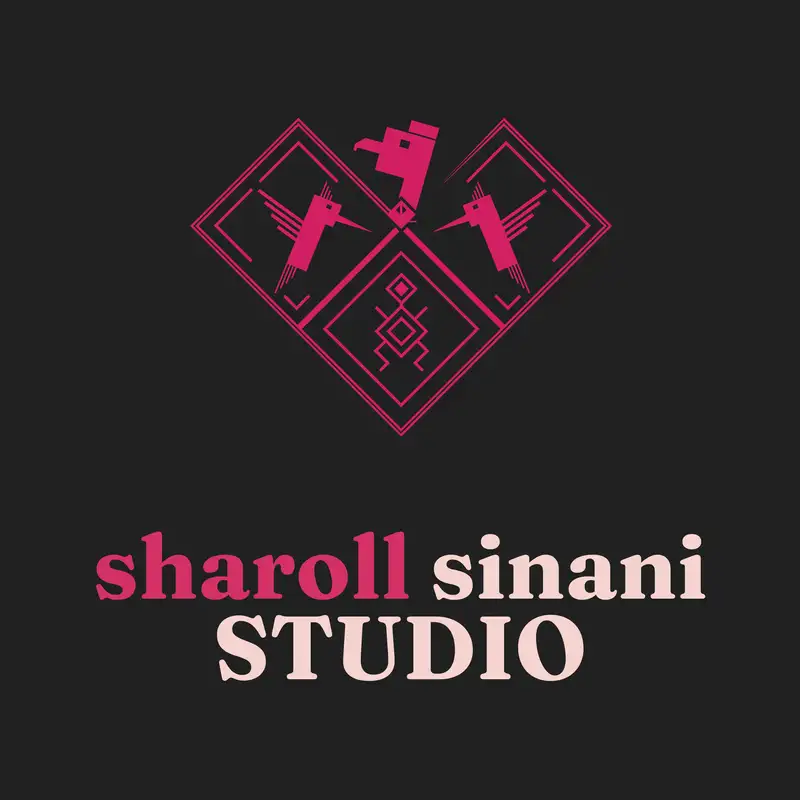Episode 5 — Season 2 Premiere: Presence, the Quiet Revolution
Sharoll Fernandez Siñani: You've
reached the Sharoll Sinani Studio.
I am Sharoll Fernandez Sinani.
Keeper of the Heart Portal where poetry,
pulses, ancestors, whisper and though
dialogue alchemizes into luminous love.
Take a breath step through.
Let's create.
Sharoll Fernandez S: Presence is the quiet
revolution that ends the endless race.
Have you ever felt like you're
always runningâbut never arriving?
Like every time you push back
against something unjust, there's
just more to push against?
I used to think that resistance
was the only path to freedom.
That the way out of harm
was always to push harder.
But then, something shifted.
I started to wonder: what if the
answer isnât just in saying no
louder⦠but in living yes more fully?
Letâs take a step back.
Iâm Aymara.
My people have been
resisting for centuries.
Colonization, racism,
patriarchyânone of this is new.
Weâre taught, especially as women
of color, to keep resisting.
And thatâs important.
But I noticed something: when all
we do is resist, we start defining
ourselves by the thing weâre resisting.
Imagine a race where the other person
sets the track, the pace, even the
finish lineâand all you do is chase
them, trying to win on their terms.
Thatâs what resistance alone can become.
Youâre still playing their game.
Still looking at them.
Still reacting to them.
And I thoughtâwait.
What would happen if I
stopped running that race?
Hegel, a philosopher, once
said something interesting.
He talked about a relationship
between a master and a slave.
He said the master only has power
if the slave sees him as the master.
That both of them depend on each
other to even have those roles.
If the oppressed stop looking
to the oppressor to define them,
the whole system starts to shake.
That idea really hit me.
Because I realized⦠if I always define
myself as âoppressed,â then Iâm letting
the oppressor be part of my identity.
And I donât want that.
I want to define myself
by something deeper.
Something rooted.
Something mine.
Thatâs what I started calling âpresence.â
Presence is knowing who you are without
needing to fight someone to prove it.
Itâs showing up in the world
with your full selfâeven if the
world still holds injustice.
Itâs not giving in.
Itâs not giving up.
Itâs shifting the center.
My presence comes from my ancestors.
People who farmed the land.
Who sang lullabies in Aymara.
Who fought quietly by surviving,
loving, and building even when
everything was against them.
They didnât only resistâthey lived.
And I carry that.
Presence is creative.
Itâs when I paint not because I need to
argue, but because I want to offer beauty.
Itâs when I write, not to prove
I exist, but to share what I see.
When I painted Aymara women in
sensual poses, I wasnât pushing
back against stereotypes.
I was painting a new vision.
One where we just areâfully ourselves.
Whole.
Alive.
Thatâs the difference.
Toni Morrison once asked:
âWhat are you without racism?â
She flipped the script.
She didnât just fight
oppressionâshe stepped outside it.
She said, âIâm not a victim.
I refuse to be one.â
Thatâs presence.
Frantz Fanon, who fought
colonialism, said something similar.
He said itâs not enough to
say ânoâ to the colonizer.
We have to say âyesâ to something new.
We have to build a self, a world, a
way of being that doesnât depend on
the people who tried to erase us.
And Hannah Arendt said rebellion can set
you free from somethingâbut revolution
is when you build freedom for something.
That hit me like lightning.
Because resistance breaks chains,
but presence builds homes.
Presence plants gardens.
It sings lullabies.
It teaches kids who they
are, not just what hurt them.
I think of Domitila Barrios de
Chungara, a Bolivian minerâs
wife who became a powerful voice.
She resisted, yes.
But what made her powerful
was that she told her story.
She said: this is who we are.
These are our dreams.
Thatâs presence.
And hereâs the thing.
Oppression doesnât just live outside us.
It tries to crawl inside.
It makes us believe lies about ourselves.
That weâre not good enough.
That weâre always behind.
That we need to prove our worth.
Thatâs called internalized oppression.
And presence is the antidote.
Presence says: I know who I am.
I am worthy, brilliant, loving, powerful.
Not because someone in power said so.
Because I know it in my bones.
Thereâs even science to back this up.
In one study, women did worse on
a math test when reminded they
were womenâbecause of stereotypes.
But when reminded they were students
at a top university, they did better.
It wasnât their ability that
changedâit was how they saw themselves.
Thatâs why presence matters.
And presence is never
just about one person.
When I stand in my truth, I create
space for others to do the same.
Itâs like lighting a
candleâone flame becomes many.
Presence doesnât mean we donât protest.
I still do.
I march.
I vote.
I speak out.
But I do it from a place of
grounded worth, not desperation.
I do it knowing the world
is already mine to shape.
And after we protest, we build.
We create art.
We host dinners.
We speak our languages.
We raise our children with dignity.
Thatâs revolution, too.
Presence is not about pretending
the system isnât there.
Itâs about refusing to
let it define your soul.
When I stopped seeing myself as a slave
looking at a masterâand instead looked
out at the horizonâeverything changed.
I wasnât stuck in that old dance anymore.
I was free to imagine.
Presence is not a final answer.
Itâs where I begin.
Itâs a posture, a stance,
a soil to grow from.
And when we live from there, weâre already
freeâno matter what the world says.
So maybe, just maybe, the next
step isnât to yell louder.
Maybe itâs to stand still.
Breathe.
Remember.
Create.
And look each other in the eyesânot
to fight, but to recognize.
Welcome to the quiet revolution.
Itâs already begun.
Sharoll Fernandez Siñani: Thank you
for journeying Inside the Heart Portal.
If these converging voices steered you,
follow, review and pass the echo on.
Until next time, keep shaping memory
into fearless presence and communal art.

